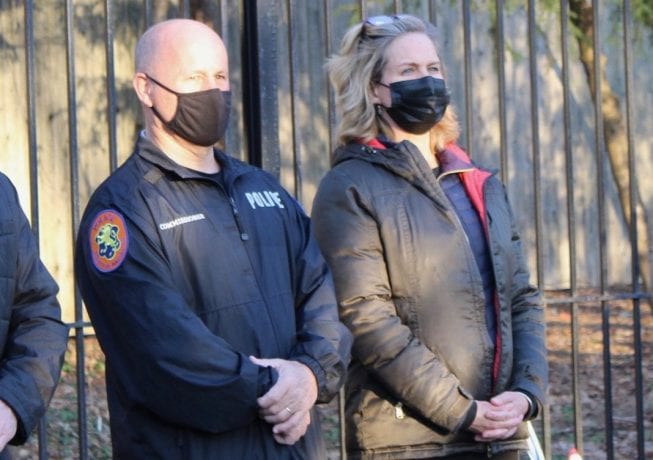Nassau County officials said they are “re-energizing” Operation Natalie, a countywide anti-opioid initiative, following a spike in drug overdose deaths during the coronavirus pandemic.
The effort — which included educational seminars for youth and adults throughout Nassau’s communities — helped drive down opioid addictions and fatalities over the last three years before that progress reversed last year amid the COVID-19 crisis, County Executive Laura Curran said Tuesday.
Both Curran and Nassau Police Commissioner Patrick Ryder said there’s a need for “re-engagement” because the pandemic negatively affected community members and prevented county officials from addressing opioid issues as they usually would.
“With the COVID pandemic, unfortunately we did start to see those overdose numbers go up,” Curran, a Democrat, said. “People were isolated, there was a lot of despair, economic insecurity. All of these things lead to that downward spiral and then starting new habits or going back to bad habits.”
Operation Natalie was named after a Massapequa teenager who became the face of the heroin epidemic nearly 10 years before the county announced its establishment in March 2018. That year, opioid deaths decreased by 25 percent from their 2016 peak.
Countywide non-fatal opioid-related overdoses subsequently dropped 21 percent from 2017’s levels to 217 cases in 2019, while fatal overdoses fell 15 percent to 44, according to Ryder.
Operation Natalie also led to the Nassau Police Department seizing $1.2 million worth of heroin in December 2019 in connection with the largest heroin-trafficking operation in the county’s history.
But fatal drug overdoses jumped 34 percent in Nassau in 2020, according to new statistics reported by Newsday. There were 287 fatal drug overdoses in the county last year, with 60 suspected overdose deaths that have not yet been confirmed by the medical examiner’s office, the paper reported.
“We were winning the battle, we were reducing our numbers… and then we got hit with COVID and we lost our way,” Ryder said.
Ryder said the most affected population was people aged 21-30, who are out of school and may be out of work without jobs to go to, a trend that was only exacerbated by the pandemic.
Drug enforcement also dropped because of the restraints of the coronavirus, but the pandemic clearly did not stop drugs being pushed into communities, Ryder said. County cops made just 294 heroin arrests in 2020, down from 766 in 2017, according to the commissioner.
The county will now add a problem-oriented police officer to each of Nassau’s eight precincts, Curran and Ryder said. That means each station will have four of those cops, compared to just one several years ago, Curran said.
Additionally, Ryder said, the county’s “Too Good For Drugs” program, which educated youth about the dangers of drug addiction and dependency, is in 48 of the 56 school districts throughout Nassau. Representatives from the police department will be returning to schools in September to resume the program as another way to “re-energize” Operation Natalie, he said.
According to Family & Children’s Association President and CEO Jeffrey L. Reynolds, the coronavirus pandemic exacerbated already high levels of anxiety and depression throughout the nation and Long Island. Federal funding, he said, would aid the Island in boosting mental health programs, especially for those in at-risk communities.
“Paradoxically, the steps we took to protect ourselves and our families from COVID also put many at risk for the anxiety and depression that comes from social isolation, uncertainty about the future and economic stress,” said Reynolds, who leads one of Long Island’s largest health and human organizations with 340 staff members, 200 volunteers and more than 30 programs that help the underserved and at-risk populations.
In May, Senate Majority Leader Chuck Schumer (D-NY) called for the federal government to release $5 billion in funding to aid mental health disorders and drug addiction. On Long Island, Schumer said, there is a need for federal funding and programs to combat mental health issues before the conditions lead to “dangerous spirals that upend lives and families.”
“Across the Island we need honed federal help and outreach so locals who know the needs can pay for creative solutions, like mobile units and program outreach to connect with more people,” Schumer said at the time.



